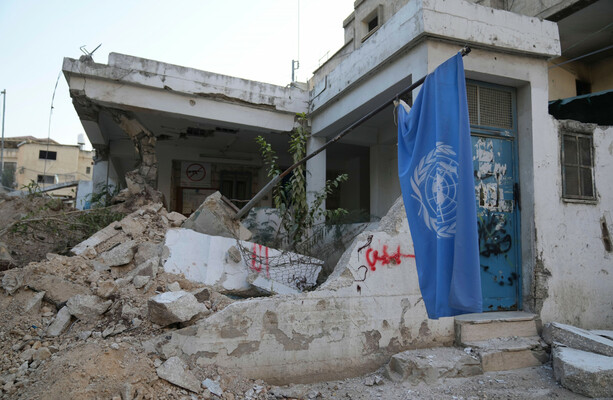Headline: Israel‘s Ban on UNRWA: A Dire New Challenge for Palestinians
In a significant escalation of tensions, the Israeli Defense Forces (IDF) have damaged a United Nations Relief and Works Agency (UNRWA) office in the West Bank, intensifying an already precarious situation for millions of Palestinians. As UNRWA faces a ban from the Israeli government, experts warn of severe humanitarian repercussions amid ongoing conflict. The decision raises urgent questions about future humanitarian aid pathways for Palestinians, thereby potentially reshaping the landscape of international assistance in the region.
The Incident: Damage to UNRWA Office
Recent reports indicate that IDF bulldozers have "severely damaged" a critical UNRWA office in the West Bank. This destruction comes amid a broader Israeli initiative to halt UNRWA activities, which Israel accuses of perpetuating terrorism and supporting militant groups. An Israeli spokesperson asserted, “The operations of UNRWA have been misused by terrorists, directly endangering our national security.” The bulldozing of this UN facility has heightened fears of increased hostilities in an area already fraught with tension.
The Ban on UNRWA: Implications for Aid
Following the incident, Israel’s outright ban on UNRWA has sparked concerns over the humanitarian impact. This UN agency has been pivotal in providing crucial services, such as education, healthcare, and emergency relief, to Palestinian refugees. Reports suggest that this ban could lead to a devastating shortage of necessary assistance for millions who rely on UNRWA’s support.
Experts warn that the decision to shutter operations could lead to “a massive ripple effect," significantly impacting individuals and communities dependent on this aid. "The humanitarian needs are already at a critical level," remarked Dr. Sarah Goldstein, a regional policy expert. “Without UNRWA, we may see an escalation in poverty, health crises, and civil unrest.”
What’s Next? The Silence on Alternative Aid Structures
Despite the sweeping ban on UNRWA, Israel has yet to propose any alternative aid structure for the Palestinian population. This absence of a contingency plan raises serious concerns among humanitarian organizations, which fear logistical collapse in the absence of UNRWA’s services.
International observers have expressed alarm, noting the potential for increased instability. Tensions in Gaza have surged with reports of worsening humanitarian conditions, sparking widespread calls for intervention. “The international community must step in to fill the gap,” stated a spokesperson from an international relief agency. “If alternative support systems are not put in place, millions will suffer.”
Context: The Humanitarian Crisis in Gaza
The humanitarian situation in Gaza has reached catastrophic levels over recent months. Aid organizations have reported shortages of medical supplies, food, and basic necessities, exacerbated by the ongoing blockade and intermittent violence. The Irish Times recently highlighted the urgent nature of the crisis, citing the dire need for sustainable humanitarian solutions.
As Israel continues to restrict UNRWA, experts are raising alarms about possible catastrophes. "What we are witnessing is a systematic dismantling of aid mechanisms that have been in place for decades,” said Dr. Emmanuel Roberts, a Middle Eastern studies scholar. “The implications of this decision could echo for generations.”
The Bigger Picture: Global Reactions
International reactions to Israel’s moves have been largely negative, with humanitarian agencies urging for reconsideration. The UN Secretary-General has emphasized the need for continued support of UNRWA, arguing that abandoning this agency would only deepen the crisis. On a regional scale, the consequences of this ban may provoke unrest, as communities struggle to cope with the fallout.
In light of these issues, media outlets and analysts continue to explore the implications of this development. Sky News emphasized in a recent report the potential for "devastating impact on millions of Palestinians," underlining the urgency of the situation.
Engage with the Issue
As the political and humanitarian dimensions of this ban unfold, the global community watches closely. Engaging in discussions about the future of aid in Palestine is crucial, particularly regarding how best to support those most in need.
What will be the long-term impact of Israel’s decision on the daily lives of Palestinians? Will we see a shift in aid dynamics, or an escalation of the crisis? Your thoughts and insights are welcome as we navigate this complex issue. We encourage you to leave your comments or share this article to foster a broader understanding of the crisis.
For more information, you can check our previous articles on the humanitarian impact of the Gaza conflict and Israeli-Palestinian relations.
Weather the human tide, the ongoing humanitarian crisis in Gaza, coupled with the ban on UNRWA, signifies a turning point in how aid is structured in conflict zones. The coming weeks will likely reveal the intent and capacity of both Israeli authorities and international agencies to address the looming catastrophe for countless Palestinian lives.
